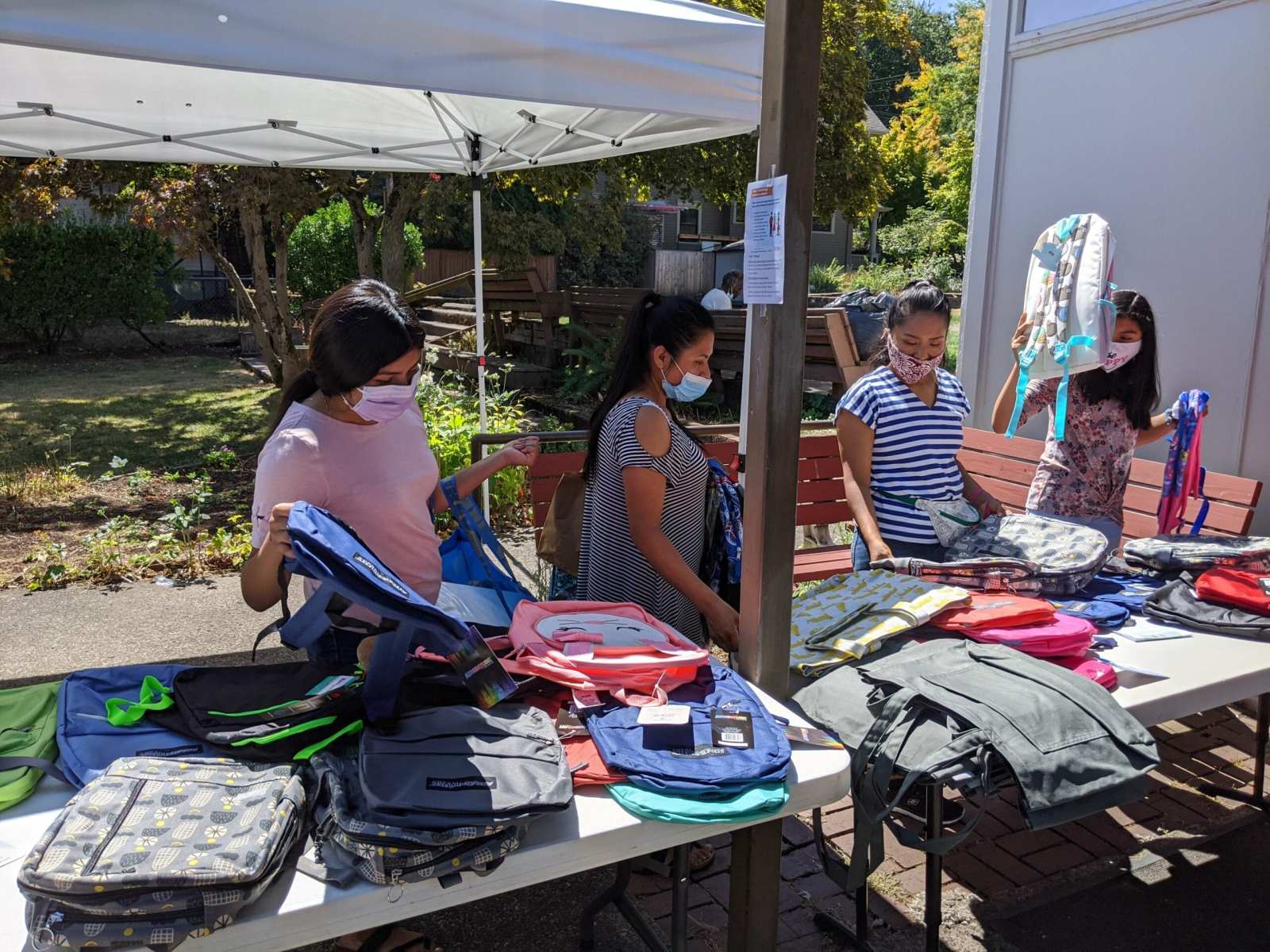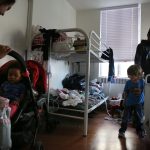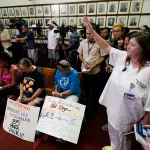Liz Starke was the final employee to leave Rose Haven last week when a woman who lives in a tent across the street rang the doorbell. The woman was “hysterical,” Starke recalled.
Starke said the woman told her, “‘I don’t know how I’m going to make it through the weekend. You’re not going to be here. What am I going to do?'”
Rose Haven provides daytime services to women, children and gender non-conforming people experiencing homelessness in Portland, Oregon, one of the most expensive cities in the country. In this case, the woman knew an ex-partner, who she said abused her, was getting released from prison soon — and she was worried about what services would be available. She was also worried about the pending heat wave.
Officials in Oregon said rising temperatures in the area — which reached a record 116 degrees Fahrenheit on Monday — has been linked to at least 79 deaths. That includes at least 52 in Multnomah County, where Portland is located. With many properties in the region lacking air conditioning, exposure to extreme heat increases the risks of injury, including death.
As extreme heat blanketed the Pacific Northwest, people who rely on places like Rose Haven have faced the brunt of the effects. Research shows women and LGBTQ+ people are among the most vulnerable to housing insecurity and homelessness. That is particularly acute in Oregon, which has one of the highest rates of people who experience unsheltered homelessness, meaning they live outside, including in tents or in cars instead of in shelters or other housing.
In Multnomah County, data from 2019 shows the number of people experiencing homelessness who are gender non-conforming grew more than any other group. And still, the research acknowledges a potential undercounting because of factors like stigmatization and discrimination.
Already, the pandemic and its effects on health, jobs and wages has exacerbated the likelihood that these marginalized communities are most likely to experience housing insecurity or homelessness. Gender-based violence, including domestic violence against women, also contributes to homelessness. Now, climate change has further complicated their lives.
“The heat wave is one disaster, but if you’re looking at it as part of a continuum of all these other climate-related or climate exacerbated disasters, it’s yet another example of how the most marginalized populations are hit over and over and over again,” said Sarah Saadian, vice president of public policy at the National Low Income Housing Coalition.
Starke ended up giving the woman from across the street some bus tickets so she could travel to a temporary cooling center set up by local officials. But the woman worried about whether her dog would be allowed (many centers did allow pets during the heatwave, though not everyone knew that), and whether her tent and other belongings would be stolen if left unattended. Starke emptied a wheelbarrow from the center, packed some water and tarps, and pleaded with the woman to seek more protection from the heat. Starke said they sat and talked for about an hour, until the woman stopped hyperventilating.
“There’s nobody else for these people to have these conversations with,” Starke said. “She only has access to a phone when she charges here, so she didn’t even know that it was going to be 115 degrees on Saturday.”
These are the daily realities of the individuals and families who come to Rose Haven, which operates out of the basement of a Portland church on the northwest side of the city. Since staff provide the bulk of their services outside due to limited volunteers and COVID-19, the heat has added another layer of hardship.
People in line this week have been handed cold water, spray bottle fans, popsicles and wet towels to cool off. They’ve been given hats and baseball caps, sunglasses and sunscreen. But supplies are limited. Every week, Rose Haven shares a list of donation requests with the public: rolling luggage, carts, backpacks. Body wipes and lip balm. Ankle socks and new underwear.
Rose Haven is open on weekdays from 9 a.m. to noon and 1 to 4 p.m. People line up outside the church before staff arrives and linger after it closes. Adults and children make their way through several designated lines, including one for supplies like diapers, wipes, pads and tampons — things they’re unable to buy with food stamps. This is also where they can also plug their phones if they have one, and where Rose Haven staff and volunteers provide tents and sleeping bags. Many of the overnight shelters do not have enough beds; housing advocates say in other instances, women and LGBTQ+ people especially do not feel safe or welcome in such congregate settings.
Starke said the staff, volunteers and people experiencing homelessness who come for the services — Rose Haven calls them their guests — are a community. Unlike some other facilities that offer assistance, no one is required to show identification or disclose information about their mental health or immigration status in order to access food, showers or counseling.
“We’re building each other up, and we’re living that shared experience as women or as people that are marginalized by their gender. Combined with access that we provide to not only basic needs services, but just things that make you feel human,” she said. “… I try to explain to folks what our needs are. It’s like, ‘Yeah. We need flat shoes. We need sweatpants. We need all of those essential things. We also need glitter. I cannot tell you what a little bit of glitter does around here.”
Rose Haven fills a gap in services — one that will become even more critical due to climate change and looming housing evictions.
Scientists say 2020 was Earth’s second hottest year on record, behind only 2016. The world’s seven warmest years have all occurred since 2014.
This has a ripple effect in the United States, where rising temperatures are being recorded in parts of the country where more than half of the homeless populations are unsheltered — including California, Oregon, Nevada, Hawaii, Arkansas and Arizona. States with the largest absolute increases in homelessness between 2019 and 2020 include Texas and Washington, other states recording extreme heat.
As climate change exacerbates the effects of weather events like flooding, hurricanes and wildfires, it increases the likelihood of more displaced people who are facing housing insecurity and homelessness.
And while the federal government has extended a moratorium on evictions during the pandemic and approved billions in rental assistance, advocates have raised questions about whether everyone who needs financial help will be able to access it and how quickly they will have that relief. Saadian said it all points to “gaping holes” in the federal housing safety net. She and other advocates worry about impending evictions.
“It’s that same failure that is allowing people to be unhoused during an extreme heat wave, and the same sort of holes that let people be at huge risk of losing their homes during the pandemic,” she said. “I think it just points to the fact that we’ve just never had this sort of infrastructure in place and if we did, people would be far better off to face any of these challenges.”
Jaboa Lake, a senior policy analyst with the Center for American Progress, works on housing issues and has close family that have experienced unsheltered homelessness in extreme heat. She said a general drop in volunteers at homeless shelters during the pandemic — a point Starke also described at Rose Haven — highlighted inequities in how local, state and federal officials fund critical public services that can house people immediately and address other related needs.
“Homelessness services shouldn’t be dependent on volunteerism in the first place,” she said. “It should be a robust investment that provides adequate resources.”
Saadian added that housing organizers are particularly dismayed at policies implemented on the local and state level that have effectively criminalized people who experience homelessness. Some policies ban tents, while others have prevented them from lingering or sleeping in public spaces.
“There’s a lot of cruelty I think in that,” she said. “That’s really at the heart of it. Whether or not communities understand that these are people who have dignity and humanity and need access to resources to help them get back on their feet.”
This leads to more encampments being dismantled (local officials have defended their actions as necessary to public safety), increasing the likelihood that homeless people move further into forms of hiding from plain sight. Starke worries that can make them more susceptible to the outside elements.
“I mean, when you don’t even have protection from the elements, when you don’t even have a tarp or a hoodie or a pair of shoes, what is that going to mean when it’s 115 degrees outside?”
Rose Haven will soon leave the basement. It is in the midst of a $3 million campaign to build a new center across the street that they plan to open in the new year. The new center will allow people to once again receive services indoors and under extended hours. Organizers are raising money in part through private donations.
Starke worries about what will happen until then. Climate change has ramifications not just with extreme heat. In a few months, there’s also the possibility of extreme cold.
The uncertainty of available beds and services frustrates Starke. Sometimes she and staff receive calls from people asking about open shelters in the area. Most often, the staff doesn’t have promising news to share.
“I think that’s the hardest part. You’re having these conversations where you’re supposed to be the rock. I’m supposed to be like, ‘It’s going to be okay.’ And I have to be like, ‘I don’t know what to tell you.'”






